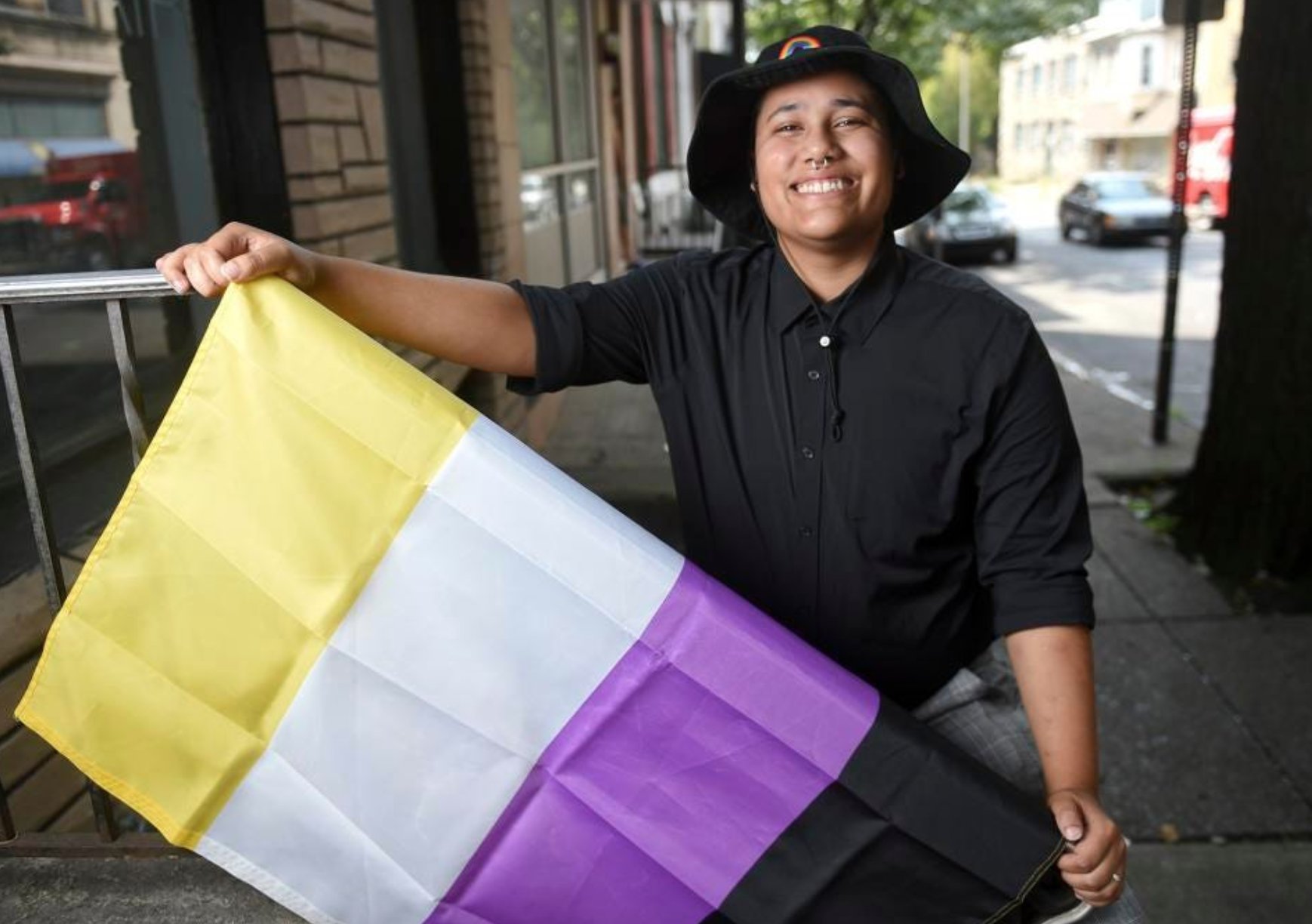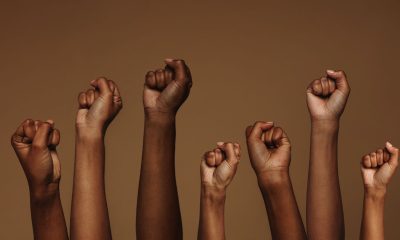Community
Make Room for the Non-Binary
I am a Baby Boomer, born in 1957, who grew up in a very binary world. Everything from party affiliation to music preference was simplified down into an “either-or” mentality. Most of the time, what this really meant was that either you fit in or you didn’t.

I am a Baby Boomer, born in 1957, who grew up in a very binary world. Everything from party affiliation to music preference was simplified down into an “either-or” mentality. Most of the time, what this really meant was that either you fit in or you didn’t.
Until recently, every form I’ve ever completed had two boxes to check for sex: male or female.
One can imagine the physical and mental health challenges that non-binary people face when their identities non-binary status are not recognized and instances assaults and abuse are underreported.
Everywhere I go, a similar dichotomy presents itself. Non-binary folks, whose gender identities are neither male nor female, are being erased and excluded from traditionally gendered spaces.
I identify as cisgender, which means that my birth sex (female) and gender (woman) align. I’m a Blesbian — Black lesbian — too, and, as a member of the LGBTQ+ community, I want to help by being an advocate for non-binary people, both within and outside of queer spaces.
Since 2020, many folks now introduce themselves with their name and pronouns: he/him, she/her, they/them, etc. This might be in part due to a year and a half of Zoom calls, where awkward clarifications of one’s gender identity can be easily avoided by listing pronouns next to names.
For cisgender allies of trans and non-binary people, stating your pronouns in your Twitter bio, office meetings, or the like is a way to help normalize the gender identities that exist outside of male and female. Gen Z-ers are leading this cultural shift towards tolerance of non-binary people in classrooms, on college campuses, and in the workplace. But some things are still the same.
In the first broad-based population study of non-binary folks, the Williams Institute at the UCLA School of Law concluded there are 1.2 million non-binary LGBTQ+ adults aged 18 to 60 in the United States. That’s 11% of the LGBTQ+ population.
The study found that the majority of non-binary LGBTQ+ adults are young, urban and white. More specifically, 58% of these non-binary folks are white, 16% are multiracial, 15% are Latinx, and 9% are Black. Non-binary people are also less likely to be straight than their cisgender counterparts: most identified as queer, bisexual, pansexual or asexual.
Non-binary (abbreviated enby), gender fluid, and/or genderqueer are terms for gender identities that do not check the male or female boxes. They/them are often the pronouns they use, though some people use variations of she/they or he/they or others like ze/hir, xe/xem, hy/hym or co/cos.
Among LGBTQ+ non-binary adults, 82% reported experiencing emotional abuse during childhood, 53% were bullied and 11% were exposed to conversion therapy. Nearly 94% say they have considered suicide; 39% have attempted it, the study found.
We know that Black transgender women are being murdered at a high rate in the United States, with many of those deaths being underreported and those folks being misgendered. Of the non-binary folks in the study, more than half reported being physically or sexually assaulted.
One can imagine the physical and mental health challenges that non-binary people face when their identities non-binary status are not recognized and instances assaults and abuse are underreported.
As our racial reckoning in this country continues, it should be inclusive of genderqueer and non-binary folks, because not everyone fits neatly into a category or box. This lesson applies to everything, whether it be in discussions of race, gender, or other socially constructed identities that inevitably leave someone behind.
Healing should be inclusive. Here’s to more education and acceptance.
This column was produced for The Progressive magazine and distributed by Tribune News Service.
Activism
Oakland Post: Week of April 30 – May 6, 2025
The printed Weekly Edition of the Oakland Post: Week of April 30 – May 6, 2025

To enlarge your view of this issue, use the slider, magnifying glass icon or full page icon in the lower right corner of the browser window.
Activism
Gov. Newsom Approves $170 Million to Fast Track Wildfire Resilience
AB 100 approves major investments in regional conservancies across the state, including over $30 million each for the Sierra Nevada, Santa Monica Mountains, State Coastal, and San Gabriel/Lower LA Rivers and Mountains conservancies. An additional $10 million will support wildfire response and resilience efforts.

By Bo Tefu
California Black Media
With wildfire season approaching, last week Gov. Gavin Newsom signed Assembly Bill (AB) 100, unlocking $170 million to fast-track wildfire prevention and forest management projects — many of which directly protect communities of color, who are often hardest hit by climate-driven disasters.
“With this latest round of funding, we’re continuing to increase the speed and size of forest and vegetation management essential to protecting communities,” said Newsom when he announced the funding on April 14.
“We are leaving no stone unturned — including cutting red tape — in our mission to ensure our neighborhoods are protected from destructive wildfires,” he said.
AB 100 approves major investments in regional conservancies across the state, including over $30 million each for the Sierra Nevada, Santa Monica Mountains, State Coastal, and San Gabriel/Lower LA Rivers and Mountains conservancies. An additional $10 million will support wildfire response and resilience efforts.
Newsom also signed an executive order suspending certain regulations to allow urgent work to move forward faster.
This funding builds on California’s broader Wildfire and Forest Resilience Action Plan, a $2.7 billion effort to reduce fuel loads, increase prescribed burning, and harden communities. The state has also launched new dashboards to keep the public informed and hold agencies accountable.
California has also committed to continue investing $200 million annually through 2028 to expand this effort, ensuring long-term resilience, particularly in vulnerable communities.
Activism
California Rideshare Drivers and Supporters Step Up Push to Unionize
Today in California, over 600,000 rideshare drivers want the ability to form or join unions for the sole purpose of collective bargaining or other mutual aid and protection. It’s a right, and recently at the State Capitol, a large number of people, including some rideshare drivers and others working in the gig economy, reaffirmed that they want to exercise it.

By Antonio Ray Harvey
California Black Media
On July 5, 1935, President Franklin D. Roosevelt signed into federal law the National Labor Relations Act (NLRA). Also known as the “Wagner Act,” the law paved the way for employees to have “the right to self-organization, to form, join, or assist labor organizations,” and “to bargain collectively through representatives of their own choosing, according to the legislation’s language.
Today in California, over 600,000 rideshare drivers want the ability to form or join unions for the sole purpose of collective bargaining or other mutual aid and protection. It’s a right, and recently at the State Capitol, a large number of people, including some rideshare drivers and others working in the gig economy, reaffirmed that they want to exercise it.
On April 8, the rideshare drivers held a rally with lawmakers to garner support for Assembly Bill (AB) 1340, the “Transportation Network Company Drivers (TNC) Labor Relations Act.”
Authored by Assemblymembers Buffy Wicks (D-Oakland) and Marc Berman (D-Menlo Park), AB 1340 would allow drivers to create a union and negotiate contracts with industry leaders like Uber and Lyft.
“All work has dignity, and every worker deserves a voice — especially in these uncertain times,” Wicks said at the rally. “AB 1340 empowers drivers with the choice to join a union and negotiate for better wages, benefits, and protections. When workers stand together, they are one of the most powerful forces for justice in California.”
Wicks and Berman were joined by three members of the California Legislative Black Caucus (CLBC): Assemblymembers Tina McKinnor (D-Inglewood), Sade Elhawary (D-Los Angeles), and Isaac Bryan (D-Ladera Heights).
Yvonne Wheeler, president of the Los Angeles County Federation of Labor; April Verrett, President of Service Employees International Union (SEIU); Tia Orr, Executive Director of SEIU; and a host of others participated in the demonstration on the grounds of the state capitol.
“This is not a gig. This is your life. This is your job,” Bryan said at the rally. “When we organize and fight for our collective needs, it pulls from the people who have so much that they don’t know what to do with it and puts it in the hands of people who are struggling every single day.”
Existing law, the “Protect App-Based Drivers and Services Act,” created by Proposition (Prop) 22, a ballot initiative, categorizes app-based drivers for companies such as Uber and Lyft as independent contractors.
Prop 22 was approved by voters in the November 2020 statewide general election. Since then, Prop 22 has been in court facing challenges from groups trying to overturn it.
However, last July, Prop 22 was upheld by the California Supreme Court last July.
In a 2024, statement after the ruling, Lyft stated that 80% of the rideshare drivers they surveyed acknowledged that Prop 22 “was good for them” and “median hourly earnings of drivers on the Lyft platform in California were 22% higher in 2023 than in 2019.”
Wicks and Berman crafted AB 1340 to circumvent Prop 22.
“With AB 1340, we are putting power in the hands of hundreds of thousands of workers to raise the bar in their industry and create a model for an equitable and innovative partnership in the tech sector,” Berman said.
-

 Activism3 weeks ago
Activism3 weeks agoOakland Post: Week of April 9 – 15, 2025
-

 #NNPA BlackPress4 weeks ago
#NNPA BlackPress4 weeks agoTrump Profits, Black America Pays the Price
-

 Activism2 weeks ago
Activism2 weeks agoOakland Post: Week of April 16 – 22, 2025
-

 Activism1 week ago
Activism1 week agoAI Is Reshaping Black Healthcare: Promise, Peril, and the Push for Improved Results in California
-

 Activism1 week ago
Activism1 week agoBarbara Lee Accepts Victory With “Responsibility, Humility and Love”
-

 #NNPA BlackPress4 weeks ago
#NNPA BlackPress4 weeks agoHarriet Tubman Scrubbed; DEI Dismantled
-

 #NNPA BlackPress4 weeks ago
#NNPA BlackPress4 weeks agoTrump Targets a Slavery Removal from the National Museum of African-American History and Culture
-

 #NNPA BlackPress4 weeks ago
#NNPA BlackPress4 weeks agoNew York Stands Firm Against Trump Administration’s Order to Abandon Diversity in Schools























































